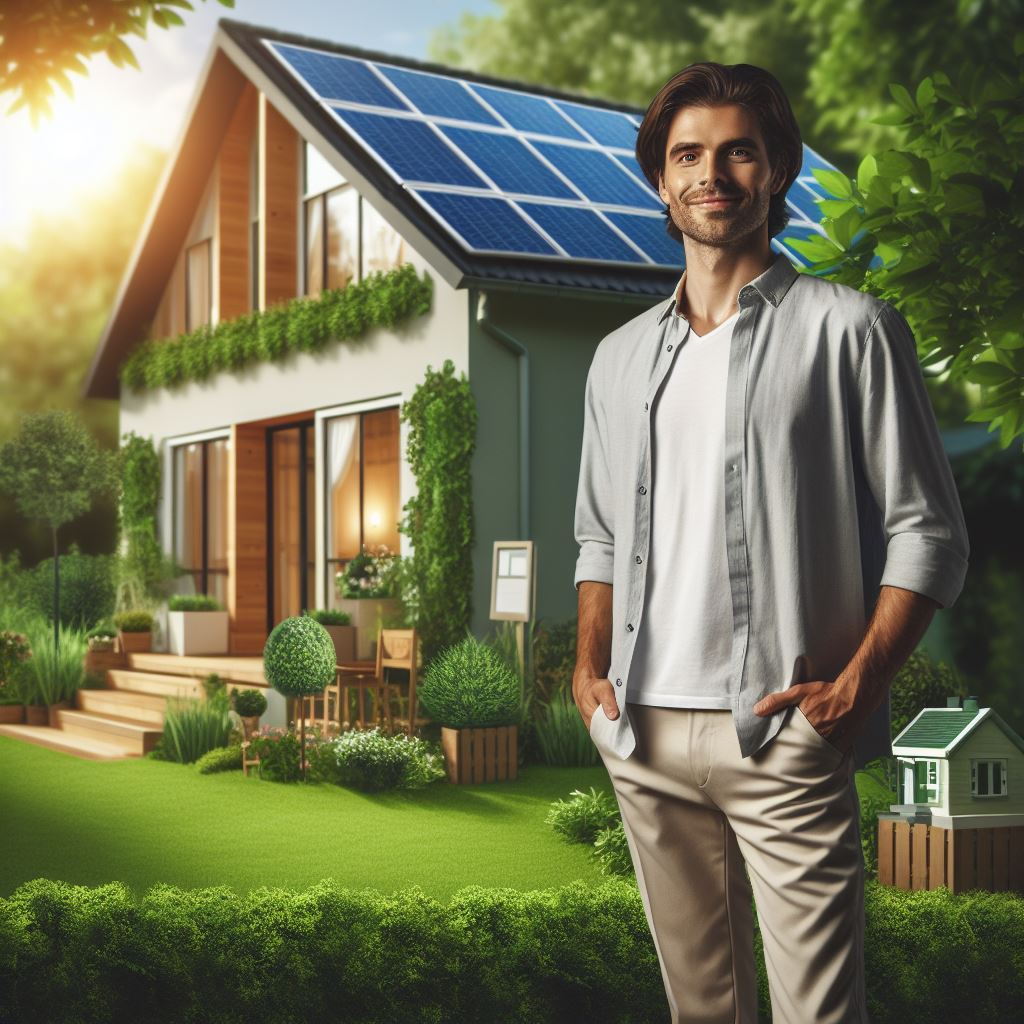Eco-Friendly Rentals: What’s Hot
Last Updated on March 6, 2024
Introduction
Eco-friendly living is becoming increasingly popular, leading to a growing interest in eco-friendly rentals.
These rentals are environmentally conscious housing options that promote sustainability and reduce carbon footprint.
With the rising concern for the environment, sustainable accommodations have gained importance in the real estate market.
Definition of eco-friendly rentals
Eco-friendly rentals refer to housing options that prioritize sustainable practices and minimize negative environmental impact.
These rentals are designed and operated in a manner that conserves energy, utilizes renewable resources, and reduces waste generation.
Growing interest in eco-friendly living
There is a noticeable increase in the number of individuals seeking eco-friendly lifestyles.
More people are realizing the importance of living sustainably and are actively looking for rentals that align with their values.
This trend has led to a surge in demand for sustainable accommodations.
Importance of eco-friendly rentals in the real estate market
Eco-friendly rentals have become essential in the real estate market due to several reasons.
Firstly, they contribute to the conservation of natural resources by implementing energy-efficient appliances, solar panels, and water-saving technologies.
This not only reduces utility costs but also helps mitigate climate change.
Secondly, sustainable accommodations offer healthier living environments by using non-toxic building materials and improving air quality.
By minimizing the use of harmful chemicals and promoting natural ventilation, these rentals ensure the well-being of tenants.
Lastly, eco-friendly rentals provide financial benefits to both landlords and tenants through reduced energy bills and tax incentives.
Additionally, as the demand for sustainable housing continues to rise, these rentals offer a competitive edge in the market.
In essence, the increasing interest in eco-friendly living has highlighted the significance of eco-friendly rentals in the real estate market.
These rentals not only promote sustainability but also offer numerous benefits to both tenants and landlords.
As individuals become more conscious of their environmental impact, eco-friendly rentals are expected to become even more popular in the years to come.
Benefits of Eco-Friendly Rentals
When it comes to renting a new home, sustainable accommodations are becoming increasingly popular.
Apart from being environmentally responsible, these rentals offer numerous benefits to both the tenants and property owners.
Let’s delve deeper into the advantages of choosing eco-friendly rentals.
Environmental Benefits
- Reduced Carbon Footprint: Eco-friendly rentals help to reduce carbon emissions, which play a significant role in climate change.
By utilizing energy-efficient appliances and renewable energy sources, these rentals contribute to a sustainable future. - Conservation of Natural Resources: Eco-friendly rentals promote the conservation of natural resources.
By implementing water-saving fixtures, reducing water consumption, and making use of sustainable building practices, these rentals contribute to the preservation of our precious resources.
Financial Benefits
- Energy Efficiency and Cost Savings: One of the significant advantages of eco-friendly rentals is the focus on energy efficiency.
These rentals are equipped with energy-saving appliances, LED lighting, and proper insulation, resulting in lower energy consumption and significant cost savings on utility bills. - Incentives and Tax Credits for Eco-Friendly Properties: Property owners who choose to invest in eco-friendly rentals can enjoy various incentives and tax credits provided by government programs.
These financial benefits encourage the adoption of sustainable practices and help offset the initial investment.
Health Benefits
- Improved Indoor Air Quality: Eco-friendly rentals prioritize the use of low-toxicity materials and proper ventilation systems, resulting in improved indoor air quality.
This helps to reduce the risk of respiratory illnesses and allergies, providing a healthier living environment for tenants. - Use of Non-Toxic Materials: Another health benefit of sustainable accommodations is the use of non-toxic materials.
These rentals avoid the use of harmful chemicals, such as volatile organic compounds (VOCs), which can have long-term detrimental effects on human health.
When considering a rental property, it’s important to weigh the benefits beyond the surface level.
Eco-friendly rentals not only help protect the environment but also provide financial savings and health advantages.
Choosing an eco-friendly rental is a conscious decision that positively impacts our planet and our everyday lives.
Read: Green Real Estate: Buyer’s Guide
Popular Eco-Friendly Features in Rentals
Apartments and houses with eco-friendly features are becoming increasingly popular among renters.
These features not only help the environment but also provide cost savings and a better living experience.
Below are some of the most sought-after eco-friendly features in rentals:
Energy-efficient appliances
Renters are looking for properties that come equipped with energy-efficient appliances.
These appliances, such as refrigerators, dishwashers, and washing machines, are designed to use less energy while still providing the same level of performance.
They help reduce utility bills and lower the carbon footprint.
Low-flow fixtures to conserve water
Water conservation is another eco-friendly feature that tenants value.
Low-flow fixtures, such as showerheads and faucets, reduce water usage without compromising water pressure or functionality.
These fixtures can significantly decrease water consumption and contribute to sustainable living.
Renewable energy sources
Properties that utilize renewable energy sources are highly desirable.
Renters prefer homes with solar panels or wind turbines that generate clean energy.
Not only does this reduce dependence on non-renewable resources, but it also provides an opportunity to lower electricity bills and participate in a greener lifestyle.
Proper insulation and HVAC systems
Good insulation and efficient HVAC systems are crucial for energy conservation.
Rental properties that have properly insulated walls, windows, and roofs help maintain a comfortable indoor temperature without excessive heating or cooling.
This reduces energy consumption and makes the property more environmentally friendly.
Use of sustainable materials in construction and furniture
Renters are increasingly interested in homes that incorporate sustainable materials in construction and furniture.
Properties that use reclaimed wood, bamboo flooring, or recycled materials not only contribute to reducing waste but also create a healthier living environment.
These materials are often more durable and have a lower impact on the environment.
Smart home technology for energy management
Smart home technology is gaining popularity in sustainable accommodations. These features allow tenants to control and monitor energy usage through connected devices.
For example, smart thermostats enable users to regulate temperature settings remotely, optimizing energy consumption.
This technology helps reduce energy waste and provides convenience to renters.
In fact, renters are increasingly looking for eco-friendly features in their rental properties.
Energy-efficient appliances, low-flow fixtures, renewable energy sources, proper insulation, sustainable materials, and smart technologies are among the most desired features.
By incorporating these features, landlords can attract environmentally conscious tenants and promote a greener lifestyle.
Read: Sustainable Landscaping Ideas
Growing Demand for Eco-Friendly Rentals
Millennial preference for sustainability
Millennials, the largest demographic group, prioritize sustainability when choosing rental properties.
They value energy-efficient appliances, recycled materials, and green spaces that promote well-being.
Millennials seek accommodations aligned with their eco-conscious lifestyle and are willing to pay extra for it.
Changing consumer attitudes towards the environment
Consumers today are more aware of their impact on the environment and seek eco-friendly options.
People are increasingly opting for rentals that incorporate green practices, such as solar panels or rainwater harvesting.
They want to minimize their carbon footprint and make a positive contribution to the environment.
Rise in government regulations promoting sustainable housing
Governments worldwide are implementing regulations to encourage sustainable housing practices.
These regulations include energy-efficiency requirements, waste reduction measures, and green building certifications.
Landlords must comply with these regulations to attract tenants and avoid penalties or legal issues.
Importance of corporate social responsibility for businesses
Businesses are recognizing the significance of corporate social responsibility, including environmental sustainability.
Companies that incorporate eco-friendly practices attract environmentally conscious employees and customers.
Investing in sustainable accommodations can enhance a company’s reputation and increase its bottom line.
Why Eco-Friendly Rentals Are the Future
The growing demand for sustainable accommodations is not just a passing trend; it is a shift in mindset.
As sustainability becomes more ingrained in society, the demand for green rental properties will continue to rise.
Here are some reasons why eco-friendly rentals are the future:
- Long-term cost savings: Eco-friendly rentals typically have lower utility bills, allowing tenants to save money in the long run.
- Well-being and health benefits: Green spaces and improved indoor air quality positively impact tenants’ well-being and health.
- Incentives and tax benefits: Governments offer incentives and tax benefits to landlords who invest in sustainable rental properties.
- Future-proofing investments: With the focus on sustainability, sustainable accommodationsare more likely to attract long-term tenants.
- Positive environmental impact: Eco-friendly rentals reduce carbon emissions, preserve natural resources, and promote a greener planet.
Eco-friendly rentals benefit not only tenants but also landlords and the wider community.
They contribute to a more sustainable future and align with the growing demand for environmentally responsible living.
Investing in eco-friendly rentals is a win-win situation for everyone involved.
The demand for sustainable accommodations is on the rise due to various factors, including millennials’ preference for sustainability.
Changing consumer attitudes, government regulations, and corporate social responsibility also contribute to this trend.
Eco-friendly rentals offer numerous benefits, such as long-term cost savings, improved well-being, and positive environmental impact.
As the world becomes more conscious of its environmental impact, eco-friendly rentals are undoubtedly the future of the housing market.
Investing in eco-friendly rentals not only meets the growing demand but also makes a positive difference in the world.
Read: Water Efficiency in Modern Homes

Case Studies of Successful Eco-Friendly Rentals
Green building certification programs
LEED (Leadership in Energy and Environmental Design) certification ensures eco-friendly features and sustainable practices.
The WELL Building Standard focuses on tenant health and well-being through improved indoor air quality and other factors.
BREEAM (Building Research Establishment Environmental Assessment Method) is widely used in Europe to assess the environmental performance of buildings.
Real-life examples of LEED-certified or ENERGY STAR-rated rentals
The Solaire in New York City is the first residential high-rise building in the United States to receive LEED Platinum certification.
The Elysian Apartments in Seattle received the ENERGY STAR rating for its energy-efficient features and reduced carbon footprint.
The Paseo Verde in Philadelphia is a LEED Gold-certified affordable housing development that incorporates sustainable design and energy-efficient systems.
Positive Feedback and tenant satisfaction from Eco-friendly rentals
Tenants of sustainable accommodations often experience improved indoor air quality, leading to better health and well-being.
Energy-efficient features result in reduced utility bills for tenants, increasing their satisfaction and financial savings.
Eco-friendly rentals create a sense of community and pride among tenants who value sustainability and environmental responsibility.
In short, case studies of successful eco-friendly rentals highlight the importance of green building certification programs.
LEED, WELL, and BREEAM certifications ensure that buildings meet rigorous standards for sustainability and tenant well-being.
Real-life examples such as the Solaire, Elysian Apartments, and Paseo Verde demonstrate the positive impact of eco-friendly features on both the environment and tenants’ satisfaction.
With improved indoor air quality, reduced utility bills, and a sense of community, sustainable accommodations offer a win-win solution for both landlords and tenants.
Read: LEED Certification: A Deep Dive
Challenges and Considerations for Eco-Friendly Rentals
When it comes to eco-friendly rentals, there are several challenges and considerations that both landlords and tenants need to be aware of.
While there are numerous benefits to living in an eco-friendly rental, it’s important to understand the potential challenges that come with it.
Higher upfront costs
One of the main challenges of sustainable accommodations is the higher upfront costs associated with them.
Eco-friendly features such as solar panels, energy-efficient appliances, and sustainable building materials tend to be more expensive to install or construct.
This can make it difficult for landlords to justify the investment and for tenants to afford the higher rents.
However, it’s important to consider the long-term savings and benefits of these features.
While the upfront costs may be higher, tenants can save money on their energy bills over time, making it a financially smart choice.
Limited availability in certain locations
Another challenge of eco-friendly rentals is the limited availability in certain locations.
Depending on where you live, finding an eco-friendly rental may be more difficult.
This is especially true in rural areas where access to sustainable resources and technologies may be limited.
However, as the demand for eco-friendly rentals continues to grow, more landlords are recognizing the importance of incorporating sustainable features into their properties.
This could lead to an increase in availability over time.
Balancing eco-friendliness with affordability
One of the main considerations for sustainable accommodations is the balance between eco-friendliness and affordability.
While it’s important to prioritize sustainability, landlords also need to consider the financial implications for both themselves and their tenants.
Finding affordable eco-friendly options can be a challenge, but it’s not impossible.
Landlords can explore government incentives and tax breaks for incorporating eco-friendly features into their properties, which can help offset the costs.
Additionally, tenants can seek out rentals with eco-friendly features that offer reasonable rents.
Maintenance and ongoing costs of eco-friendly features
Maintenance and ongoing costs are another consideration for sustainable accommodations.
While eco-friendly features are designed to be durable and energy-efficient, they still require regular maintenance and occasional repairs.
Landlords need to be prepared to allocate resources for the maintenance of these features, whether it’s regularly inspecting solar panels or ensuring energy-efficient systems are running optimally.
This will help ensure that the eco-friendly features continue to provide their intended benefits over time.
Tenants should also be aware of the potential maintenance costs when considering an eco-friendly rental.
Understanding how to properly maintain and care for these features can help prevent costly repairs down the line.
In general, while there are challenges and considerations associated with sustainable accommodations, the benefits and positive impact on the environment outweigh the potential drawbacks.
By being aware of these challenges and finding solutions, both landlords and tenants can contribute to a more sustainable future while enjoying the benefits of eco-friendly living.
Future Outlook for Eco-Friendly Rentals
Continued growth in eco-friendly housing market
The demand for eco-friendly rentals is expected to continue increasing as more people prioritize sustainability.
Rising awareness about climate change and the need for environmental conservation contribute to this growth.
Governments and organizations worldwide are also implementing policies and incentives to promote eco-friendly housing.
Developers and real estate companies are recognizing the market potential and investing in sustainable rental properties.
Advancements in technology and sustainable building practices
Innovations in technology and sustainable building practices are driving the development of sustainable accommodations.
Smart home systems, energy-efficient appliances, and renewable energy sources are becoming more accessible and affordable.
Materials such as recycled steel, bamboo, and sustainable woods are used in construction to reduce environmental impact.
Advancements in insulation, HVAC systems, and water conservation technologies further enhance the eco-friendliness of these rentals.
Greater accessibility and affordability of eco-friendly features
As the demand for eco-friendly rentals grows, the availability and affordability of green features are increasing.
Initially, eco-friendly housing might have been perceived as expensive, but technological advancements have lowered costs.
Governments and financial institutions are offering incentives and loans to promote energy-efficient and sustainable buildings.
Additionally, the long-term savings on utility bills and the positive impact on the environment make sustainable accommodations more attractive.
Potential for eco-friendly rentals to become the norm rather than the exception
With the continued growth in eco-friendly housing and advancements in technology, it is plausible for eco-friendly rentals to become the norm.
As consumers become more conscious of their environmental footprint, they will actively seek out sustainable housing options.
The demand for traditional rentals might decrease as people prioritize living in eco-friendly and energy-efficient properties.
This shift could lead to a significant change in the real estate industry, promoting a more sustainable future.
In review, the future outlook for sustainable accommodations is promising.
Continued growth in the eco-friendly housing market, coupled with advancements in technology and sustainable building practices, will drive the availability and affordability of such rentals.
With greater accessibility and incentives, eco-friendly features are becoming more prevalent.
There is a potential for eco-friendly rentals to become the norm, as individuals prioritize living in sustainable properties.
This trend signifies a positive shift towards a more environmentally conscious future.
Conclusion
Eco-friendly rentals offer numerous benefits such as reduced energy consumption, lower utility bills, and healthier living environments.
By choosing sustainable accommodations, individuals can play an active role in protecting the environment and promoting sustainability.
We strongly encourage readers to prioritize eco-friendly options when searching for rentals.
Consider factors like energy-efficient appliances, renewable energy sources, and sustainable building materials.
By making conscious choices, we can contribute to a greener future and support sustainable living initiatives.
The future of eco-friendly rentals is incredibly promising and holds great potential.
As more people become aware of the importance of sustainability, the demand for sustainable accommodations will continue to grow.
Real estate developers and landlords should seize this opportunity and invest in eco-friendly features to attract environmentally-conscious tenants.
Eco-friendly rentals are not only beneficial for the environment but also financially rewarding in the long run.
Together, we can create a sustainable and eco-friendly future in the real estate market.


